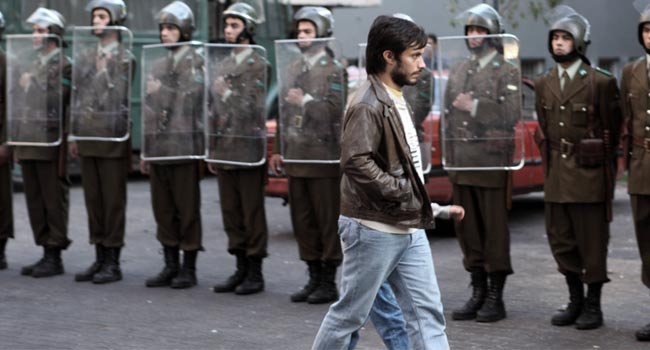
No is lighthearted enough to be a crowd pleaser, but not as emotionally impacting as it should have been.

No is lighthearted enough to be a crowd pleaser, but not as emotionally impacting as it should have been.
Right around the time the world began to awe over household microwaves (something touched on in this film), the country of Chile was in the middle of a huge political reform with a public election that could free their country from oppression. Pablo Larraín’s No observes the incredible historic event from the stimulating viewpoint of an advertising campaign that was in charge of putting the dictatorship to an end. Much like the film Argo, No provides a fast paced and feelgood take on an historical event that is not as known or talked about as it should be.
Back in 1988, Chilean dictator General Augusto Pinochet started to receive international pressure to legitimize his oppressive dictatorship that had been in power for 15 years. A democratic vote took place to determine if Pinochet should have another 8-year term as the President of Chile. For 27 days each side, a Yes party in favor of keeping the dictator and a No party that aimed to free the country, was granted 15 minutes of television airtime to persuade the public on which side to vote for.
Because the No party was convinced that the vote would be fixed, they figured they had no chance to actually win. Unmotivated, they planned to use their 15 minutes to simply make people aware of everyone who have been killed and tortured under Pinochet’s power instead of trying to win a fight they deemed unwinnable. But that all changed when the advertising visionary Rene (Gael Garcia Bernal) was called in to head up the campaign. Rene was determined that the No party stood a chance if they used more of an upbeat approach to win votes instead of just using scare tactics to send a message.

In many ways the film No replicated the philosophy that was used by the No campaign. Instead of showing how violent and scary the government was, the film was a light and almost cheery way to present such a serious subject matter. This procedure proved to work for the campaign, so the decision not to change the formula for the film was a wise one.
Another clever concept that No borrowed from the campaign was the aesthetics found from that time period. By utilizing a 1983 U-Matic video camera to shoot the film, it gave a washed out and grainy picture which allowed the film to add in real archive footage from that time period seamlessly with new footage. Constructing a film that looked like a VHS that was watched one too many times wonderfully captures the look and feel of the era. It might sound gimmicky, but it was used to perfection and gave No a great nostalgic finish.
As if liberating a country from oppression was not enough of a story, the film tries to add in some personal touches by detailing the background of Rene’s family life. However, the film merely introduces the fact that he has an 8-year-old child and a rocky relationship with his wife, but does not go beyond a simple introduction and the occasional appearance. So instead of utilizing the subplot to make the overall story more emotional, the subplots simply get in the way and do not add up to much.
No was surprisingly more similar to an episode of Mad Men than a standard historical thriller as it concentrates more on the struggles of the advertising world than the history of a country. While the sub-plots that involved Rene’s personal life felt meaningless and empty, the main storyline is invigorating enough to make up for some of the minor flaws. The end result is a film about an important piece of history that is told from a unique perspective. No is lighthearted enough to be a crowd pleaser, but not as emotionally impacting as it should have been.